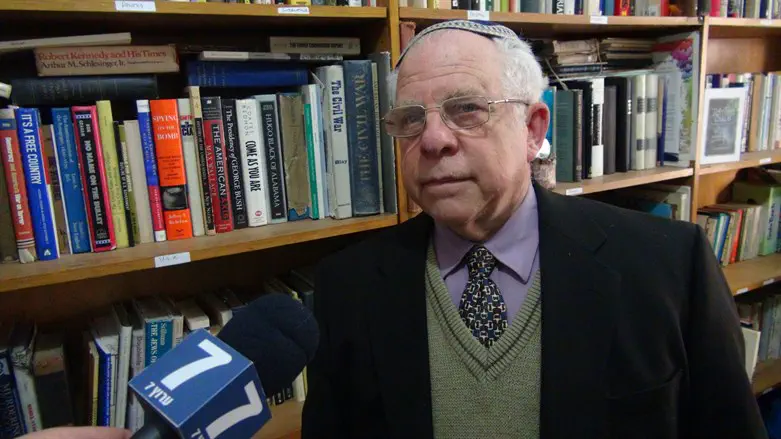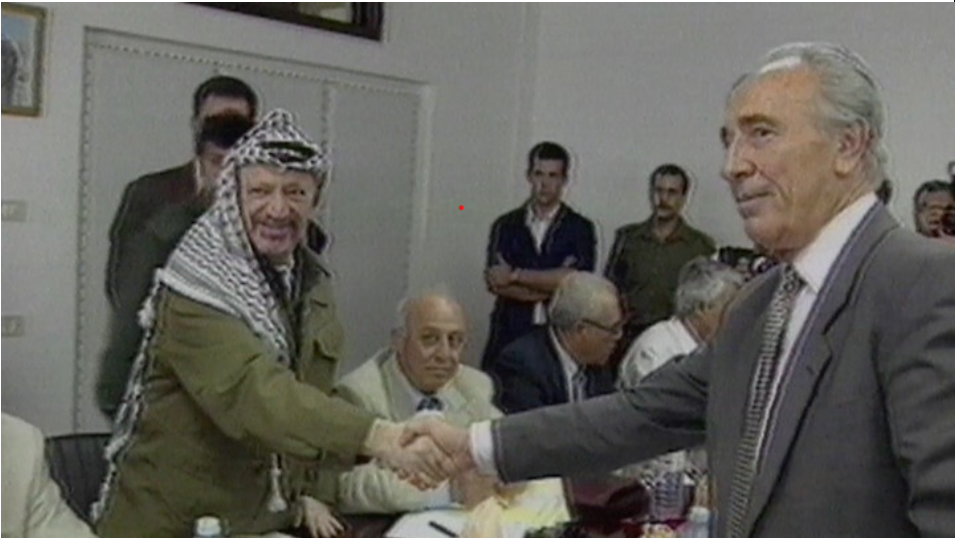
1. In June 1992, with the defeat of the Likud government and the ascension of the Labor Party, the Palestine Liberation Organization, an outlawed terrorist organization in a full state of total war against Israel raised its profile and initiated illegal contacts with the Israel Labor Party.
I worked at the time as the Jerusalem Correspondent for CNN Radio, with access to high-level contacts with the Israel and US government. Therefore, I was in a position to confirm that the Bush Administration, and subsequently the new Clinton Administration, laid out policy directives mandating that Israel must follow up on these PLO contacts, illegal according to Israeli law, but described by the US government as a PLO peace initiative.
In August 1993, Israeli Foreign Minister Shimon Peres was summoned to Washington to coordinate a shift in Israeli policy, which now officially recognized the PLO as a partner for peace, despite continuing PLO terror attacks. That policy engendered the Oslo process and an accord which was signed on the White House lawn September 13, 1993, yet never ratified by the PLO.

Sources in the Israeli security establishment and the Likud opposition in the Knesset raised objections to the new US pressure on Israel to recognize the PLO as a peace partner. However, it was exactly at this time that Aharon Barak became chief justice of the Supreme Court of Israel.
In 1992, Justice Barak established a precedent to throw out all legal objections to what would become the Oslo peace process.
The Barak court did not object to the September 13 accords, despite the fact that these accords were never ratified by the PLO, and despite the fact that the PLO never renounced its public incitement to violence nor cancelled its charter to destroy Israel.
The Barak court did not object to the September 15 policy statement by the Israeli government that the IDF would supply guns to the armed forces of the PLO. Those Israeli-armed PLO forces are now in an open war against Israel.
The Barak court did not object to the decision of the Israel government to free hordes of convicted PLO felons who had been convicted of murder or attempted murder. Over the past 30 years, families of victims murdered by these felons had appealed to the high court to file motions against freeing them, citing the government’s failure to apply any system of recidivism verification, to determine whether these felons were likely to repeat their capital crimes. All this was to no avail.
A retired commander of Israel’s Security Services in Jerusalem has confirmed that Israel has freed at least 9,000 first-degree felons without any regard to the possibility of them repeating their crimes.
2. Abrogating civil iberties and property rights from Jews in any area acquired (or re-acquired) by Israel in the 1967 defensive war.
A central feature of US Middle East Policy in 1992, which was adopted by the Israeli government and echoed by Israel’s courts, concerned a policy of delegitimizing civil liberties and property rights of Jews who live in Judea, Samaria, Gush Katif and even Jerusalem.
For thirty years, the Israeli High Court has tossed out successive cases where Jews in Judea, Samaria and Jerusalem sued for their civil liberties and property rights.
The most egregious decisions of the Barak court concerned the plight of Jews expelled from their homes in Gush Katif and Samaria in 2005. The harsh reality was that the Israeli government was not prepared to provide for 1,700 families, over 8000 citizens, evicted from their homes in the twenty-one Jewish communities of Gush Katif.
On the eve of the Katif expulsions, at an August 23, 2005 press conference, Attorney Yitzhak Meron provided sobering evidence of the failures of the Sharon government in this regard.
Dr. Meron was a senior member of the Israel Legal Forum, an organization of 50 Israeli lawyers that worked pro bono during the period leading up to the expulsion in an effort to ameliorate the difficulties of the Gush Katif residents, presenting their case to the Knesset and the courts.
The government approach to the Israeli citizens living in Gush Katif (which had been built with government encuragement), according to Dr. Meron, was “aggressive” from the very beginning, with a lack of direct communication.
The prime minister never went to “look in their eyes,” and ministers in the government who voted for expulsion did so without having visited the communities whose fates they were deciding. When the Defense Minister finally traveled to Katif to meet with residents there on April 19, 2005, he refused to answer questions. I witnessed that refusal.
Three days before the expulsion was to begin, the government announced that 1,000 rooms had been rented and everyone would have somewhere to stay. The reality was that 2,500 rooms were required due to the number of large families. Officials had to scour Israel, seeking rooms at the last moment. The Forum assisted in this emergency action.
People were expelled from their homes literally not knowing where they were going to go. No social workers were sent by the government to help people cope logistically, or psychologists to help with trauma.
Because the government ordered thousands of people removed from their homes, it was obligated to provide satisfactory alternative housing. However, that took ten to fifteen years, without any objection from the courts.

Supreme Court Chief Justice Aharon Barak rejected the final appeal before the Katif expulsions, giving an order for bulldozers to begin demolition.
I was present when Supreme Court Chief Justice Aharon Barak rejected the final appeal before the Katif expulsions. Dr. Meron, speaking upon behalf of the Katif community, appealed to Justice Barak to consider the justice of their case.
These “settlers” were by then resigned to the hopelessness of fighting the expulsion and only asked at the end for a relocation process to be implemented.
Barak turned to the government attorney and asked whether the government had a plan to resettle the twenty-one Katif communities. When the attorney responded vaguely that the government would take care of everything, Justice Barak smiled, thanked him, and gave an order for bulldozers to begin demolition.
When the US announced its policy to demand the removal of Jews from Judea, Samaria and the Old City of Jerusalem, a delegation of US citizens who live in these communities approached the US Consul in Jerusalem, Mr. Philip Wilcox, about the human rights of Jews in these communities.
Wilcox responded with a single sentence that should have echoed around the world: “If you live there, you have no human rights.”
There was silence in the room. Wilcox then asked participants if they would like coffee or tea.
The legacy of Philip Wilcox lives on in the Foundation for Middle East Peace, which finances 40 organizations that support the PLO and advocate for the continuing expulsions of Jews from their homes.
Thus, the Israeli High Court of Justice paved the way for the Palestine Liberation Organization to gain land and power in the heartland of Israel.
Yet the PLO openly refuses to endorse a two-state solution. In the words of retired Member of Knesset Benny Begin, “The PLO wants a two-stage solution, not a two-state solution.”
Thanks to the Israeli High Court of Justice, the PLO is getting away with it.
Just two stories about the politically motivated Israeli High Court. There are many more.